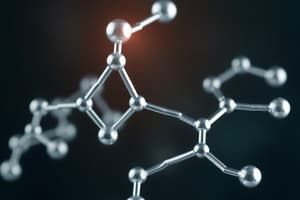Podcast
Questions and Answers
What type of bonds are primarily focused on in organic chemistry?
What type of bonds are primarily focused on in organic chemistry?
- Ionic bonds
- Hydrogen bonds
- Metallic bonds
- Covalent bonds (correct)
Which molecule represents one of the simplest organic molecules with four single covalent bonds?
Which molecule represents one of the simplest organic molecules with four single covalent bonds?
- Ethane (C₂H₆)
- Methanol (CH₃OH)
- Ethene (C₂H₄)
- Methane (CH₄) (correct)
Which branch of chemistry focuses specifically on the study of carbon compounds?
Which branch of chemistry focuses specifically on the study of carbon compounds?
- Physical chemistry
- Inorganic chemistry
- Analytical chemistry
- Organic chemistry (correct)
What is the versatility of organic chemistry attributed to?
What is the versatility of organic chemistry attributed to?
Which element can be bonded with carbon in organic compounds, along with hydrogen?
Which element can be bonded with carbon in organic compounds, along with hydrogen?
Why is understanding molecular structures important in organic chemistry?
Why is understanding molecular structures important in organic chemistry?
What is the term used to describe the multiple possible representations of a single compound due to resonance interactions?
What is the term used to describe the multiple possible representations of a single compound due to resonance interactions?
Which functional group is represented by the chemical formula C=O?
Which functional group is represented by the chemical formula C=O?
Which type of reaction involves the addition of an electrophile to an unsaturated molecule?
Which type of reaction involves the addition of an electrophile to an unsaturated molecule?
What do organic chemists use functional groups for in synthesizing new molecules?
What do organic chemists use functional groups for in synthesizing new molecules?
Which area benefits from the use of organic chemistry in developing pesticides and fertilizers?
Which area benefits from the use of organic chemistry in developing pesticides and fertilizers?
What is a key application of organic chemistry in energy production?
What is a key application of organic chemistry in energy production?
Flashcards are hidden until you start studying
Study Notes
Exploring Organic Chemistry: The World of Carbon Compounds
Organic chemistry is a fascinating branch within the broader field of chemistry, focusing specifically on the study of carbon compounds—molecules containing carbon atoms bonded with hydrogen and other elements like oxygen, nitrogen, sulfur, and phosphorus. This diverse discipline offers countless opportunities for discovery and innovation due to the versatility of carboxylic acids, alcohols, aldehydes, ketones, amines, ethers, and numerous other classes of molecules found within its purview. In this article, we'll delve into some fundamental aspects of organic chemistry and explore why it has such far-reaching applications across various industries.
Molecular Structure and Bonding
In organic chemistry, the focus is primarily on covalent bonds between carbon and neighboring atoms. These bonds can form single, double, triple, or even aromatic structures depending upon their electron configuration and arrangement. For example, methane (CH₄) represents one of the simplest organic molecules formed through four single covalent bonds. Understanding these molecular structures provides a strong foundation for analyzing chemical reactions.
Carbon atoms also possess unique characteristics due to their ability to engage in resonance interactions, which lead to multiple possible representations of a single compound known as "resonance structures." These varying depictions help chemists understand how electrons distribute themselves during reaction pathways. They allow us to predict products without necessarily knowing every step involved in the process.
Functional Groups and Reactions
Organic molecules contain specific functional groups, which are collections of atoms responsible for characteristic properties and reactivities. Common examples include carbonyl (C=O), ester (-COOR), ether (-O-R), alkene (C≡C), amine (-NH₂), and halogen (-X). By understanding these functional groups and the types of reactions they undergo, chemists can synthesize new molecules with tailored properties for pharmaceuticals, polymers, foods, and many other purposes.
Some common reactions in organic chemistry involve nucleophilic substitution, electrophilic addition, elimination, oxidation, reduction, condensation, and acid–base processes. Each plays a crucial role in our efforts to synthesize complex organic molecules from simpler precursors.
Applications of Organic Chemistry
The practical importance of organic chemistry stems from its applicability to almost all areas of human activity. Some notable uses of organic chemicals include:
- Pharmaceutical drugs: From aspirin and antibiotics to cancer treatments and painkillers, organic molecules play critical roles in keeping humanity healthy.
- Polymers: Synthetic materials made using organic monomers permeate nearly every aspect of modern society, from plastics and textiles to advanced composites used in aircraft and spacecraft construction.
- Flavors and fragrances: Essential oils extracted from plants employ organic compounds to create distinctive aromas that captivate our senses. Similarly, artificial flavors mimic natural flavors using synthetic organic molecules.
- Agriculture: Pesticides, herbicides, fungicides, fertilizers, and plant growth regulators rely heavily on organic chemistry principles for development and application.
- Energy production: Biofuels derived from renewable biomass feedstocks offer promising alternatives to fossil fuels; organic chemistry is instrumental in developing efficient methods for producing these biofuels.
As science progresses, so does the demand for innovative solutions to global challenges. With each groundbreaking discovery, organic chemistry continues to cement itself as a cornerstone of scientific exploration, enriching our lives in surprising ways while fostering further curiosity and advancement.
Studying That Suits You
Use AI to generate personalized quizzes and flashcards to suit your learning preferences.




